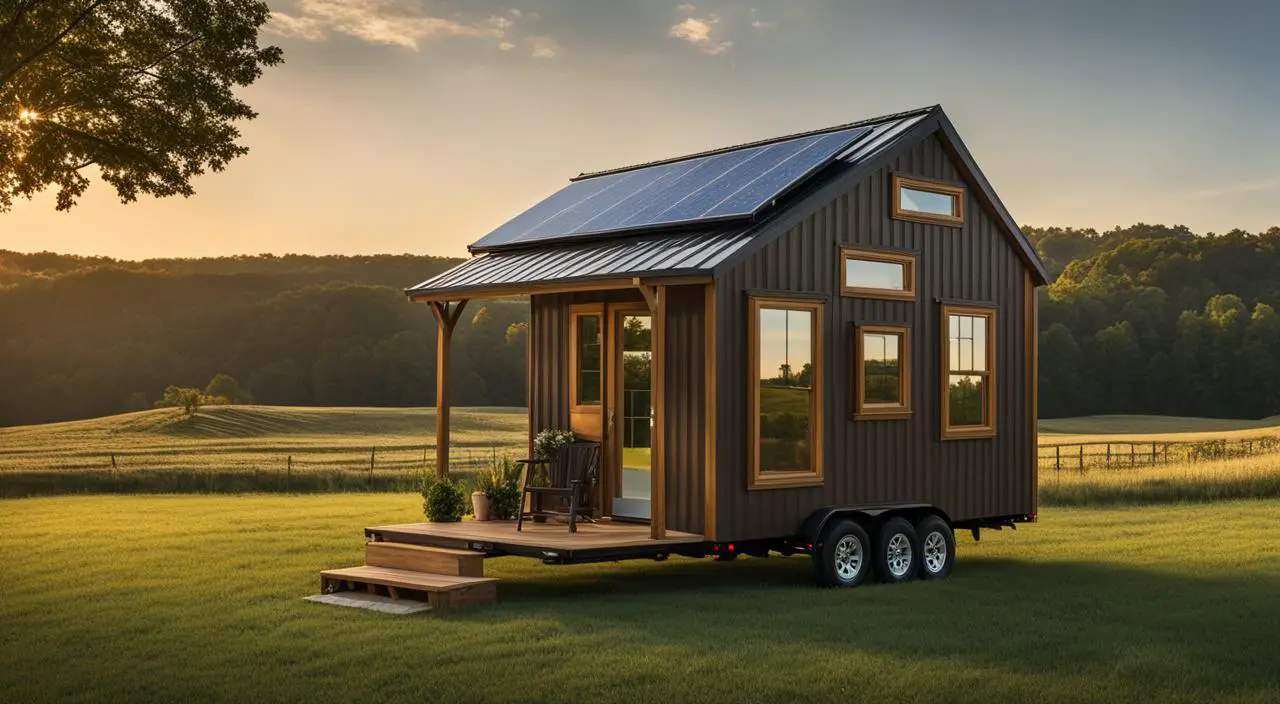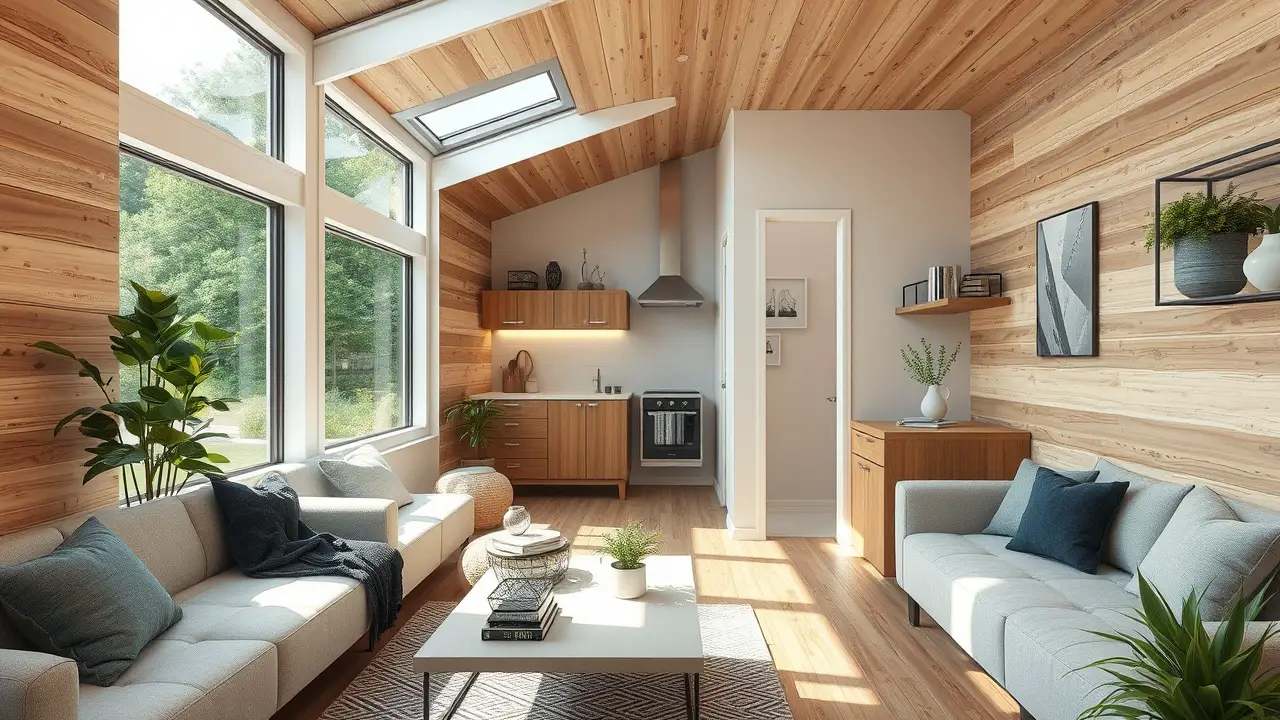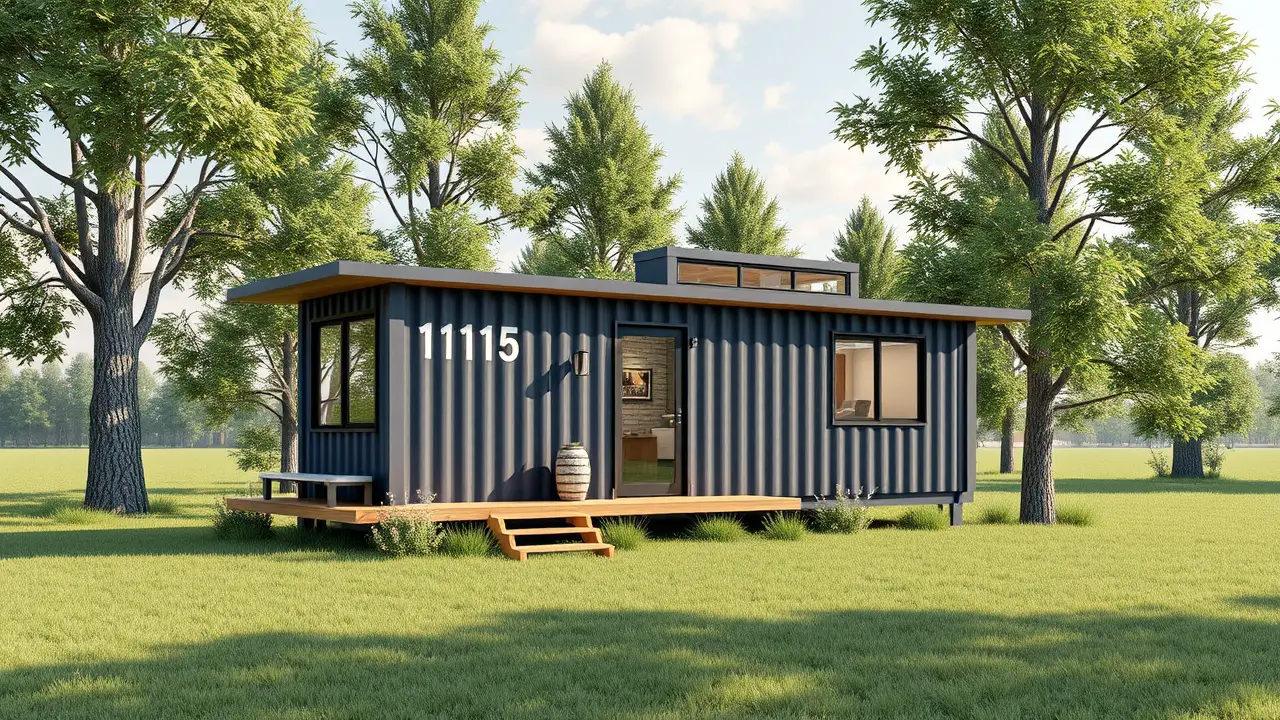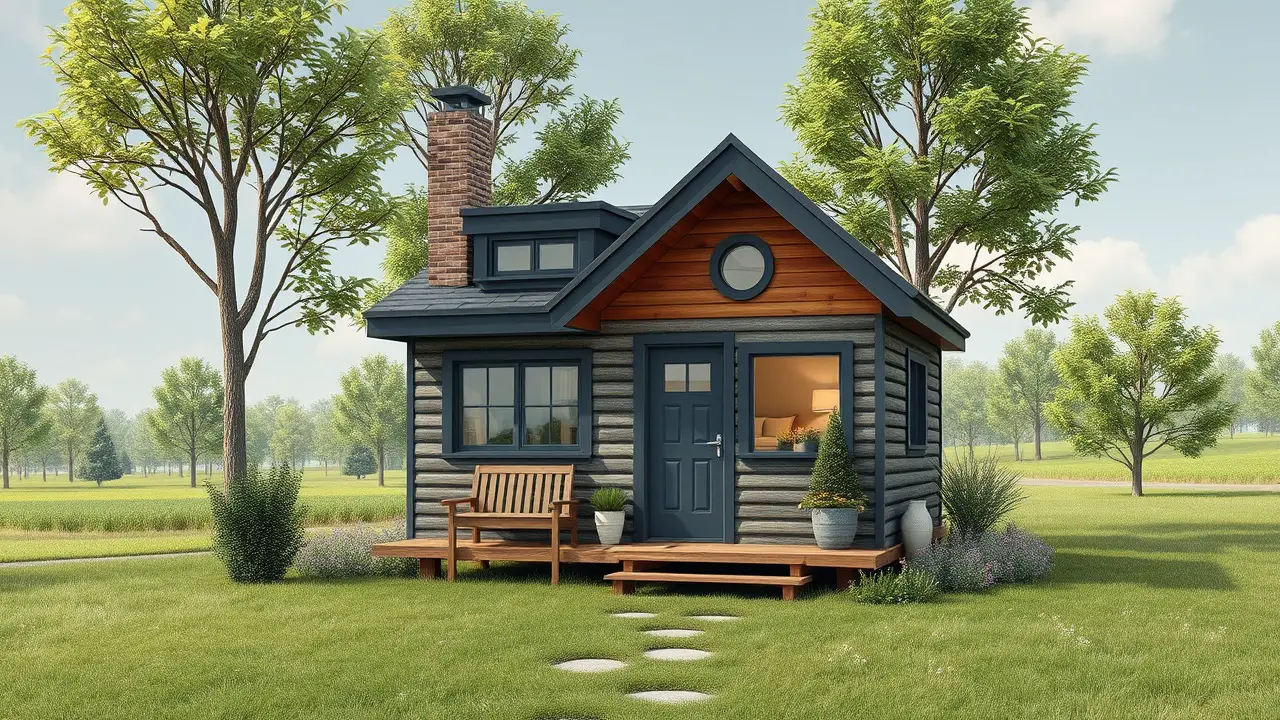If you’re considering tiny house living in Tennessee, it’s essential to understand the regulations and laws surrounding this unique housing option.
Living in a tiny house can be an eco-friendly and budget-friendly solution, but it’s crucial to make sure you’re following the rules and regulations to avoid any legal issues.
Contents
This article will provide a comprehensive overview of the tiny house laws in Tennessee.
You’ll learn about zoning laws and regulations, compliance with building codes and permit processes, legal considerations, and requirements for tiny house owners in the state.
With this knowledge, you’ll be equipped to make informed decisions about your tiny house and avoid any legal complications that could arise from not following the regulations.
Understanding Zoning Laws and Regulations for Tiny Houses in Tennessee
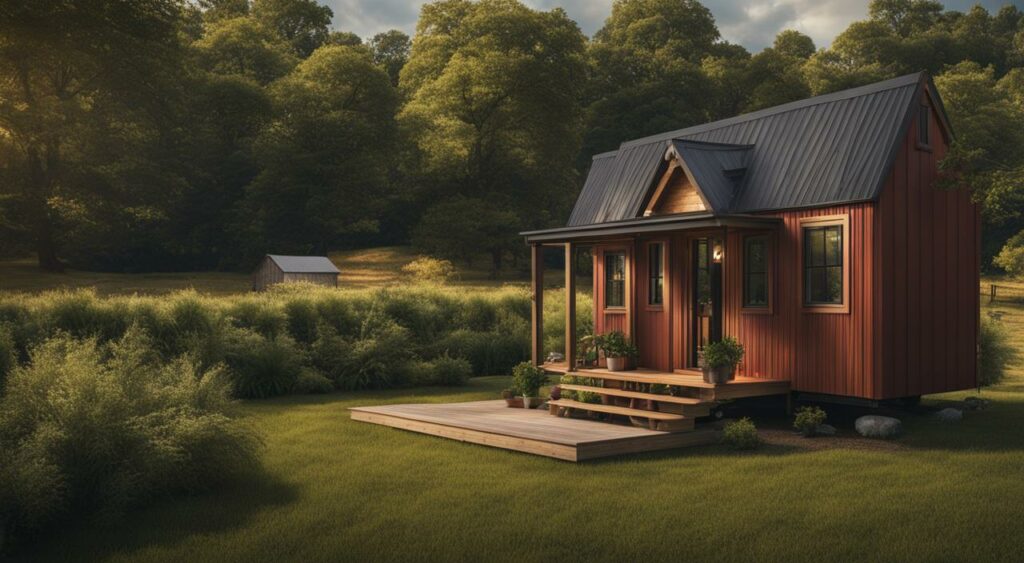
When it comes to tiny house living in Tennessee, understanding zoning laws and regulations is essential.
Since tiny homes fall into a unique category that isn’t quite a traditional house, mobile home, or RV, there are specific rules that govern their use and placement.
At the state level, there are no specific laws that regulate tiny houses, but there are rules regarding how they can be used.
For example, tiny homes in Tennessee must meet the state’s building code requirements for residential structures.
Additionally, tiny homes must be anchored to a foundation and cannot be moved without appropriate permits.However, the regulations for tiny homes in Tennessee are primarily determined at the county level.
Each county has its own set of zoning laws and regulations governing the use and placement of tiny homes. Some counties may allow tiny homes as a primary residence while others may only allow them as an accessory dwelling unit.
State Laws on Tiny Homes in Tennessee
In Tennessee, tiny homes are classified as residential structures and must comply with the state’s building code requirements.
This includes regulations related to square footage, safety requirements, and more. A tiny house in Tennessee must be anchored to a foundation and cannot be moved without proper permits.
County Laws on Tiny Homes in Tennessee
Each county in Tennessee has its own set of zoning laws and regulations governing the use and placement of tiny homes.
Some counties may allow tiny homes as a primary residence, while others may only allow them as an accessory dwelling unit.
It’s essential to research the specific zoning laws and regulations in the county where you plan to live to ensure compliance.
Legal Considerations for Tiny Homes in Tennessee
When it comes to tiny homes in Tennessee, there are several legal considerations to keep in mind. First and foremost, it’s crucial to ensure that your tiny home is built to meet the state’s building code requirements for residential structures.
Additionally, if you plan to use your tiny home as a primary residence, you’ll need to comply with the specific zoning laws and regulations in your county.
It’s also important to note that not all tiny homes are considered legal in Tennessee.
If your tiny home does not meet the state’s building code requirements, it may be considered an illegal structure, and you could be subject to fines and other penalties.
Zoning Laws for Tiny Homes in Tennessee
The specific zoning laws for tiny homes in Tennessee vary by county. Some counties may allow tiny homes as a primary residence, while others may only allow them as an accessory dwelling unit.
It’s crucial to research the specific zoning laws and regulations in your county to ensure that your tiny home complies with all relevant regulations.
Permit Process for Tiny House Construction in Tennessee
The permit process for constructing a tiny house in Tennessee varies by county, and it’s essential to research the specific requirements in your area.
In general, however, you’ll need to obtain the necessary permits and approvals before beginning construction on your tiny home.
Compliance with Building Codes and Permit Process for Tiny House Construction in Tennessee
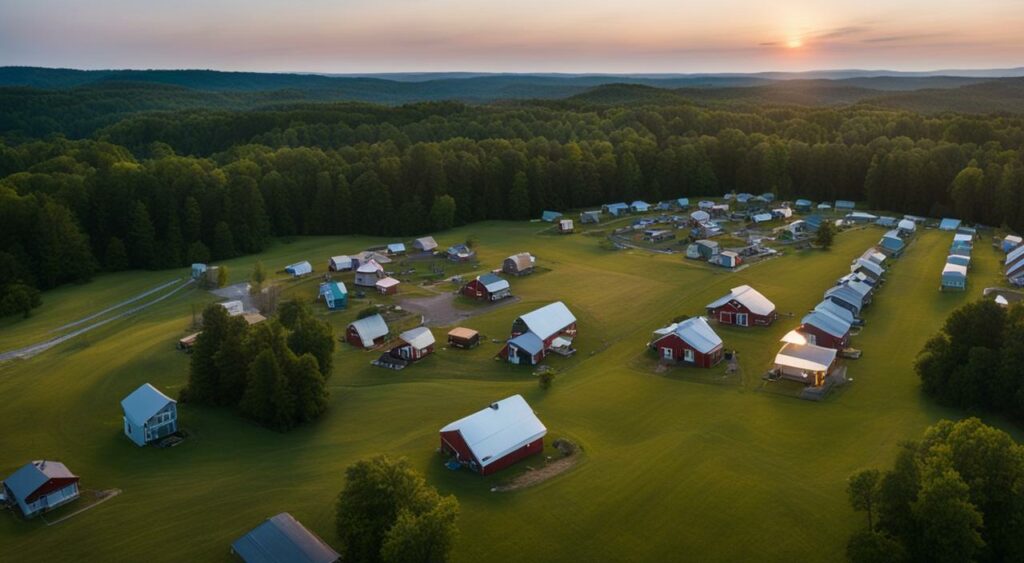
When it comes to building a tiny house in Tennessee, there are specific building codes and a permit process that must be followed. One of the first things to consider is the square footage of the tiny house.
In the United States, any structure that is less than 400 square feet is considered a mobile home and must comply with specific rules and regulations.
In Nashville, for example, the law requires that a tiny house built on a foundation must be at least 220 square feet. A tiny house built on a trailer, however, is considered a recreational vehicle and must comply with RV regulations.
It is essential to check with local authorities to ensure compliance with the rules and regulations specific to your area.
| Type of Tiny House | Rules and Regulations |
|---|---|
| Mobile Home | Less than 400 square feet, specific rules and regulations apply |
| Tiny House on a Foundation | Must be at least 220 square feet, comply with local building codes and permit process |
| Tiny House on a Trailer | Considered a recreational vehicle, must comply with RV regulations |
Before starting the construction process, it is essential to obtain the necessary permits. Building permits are typically issued by local authorities and ensure that the tiny house complies with safety standards and building codes.
Failure to obtain the necessary permits can result in hefty fines and may even lead to the removal of the structure. It is also important to note that the permit process and building codes may vary from state to state and even from county to county.
It is crucial to research and follow the rules and regulations specific to your location. Once the tiny house is completed, it must be inspected by a local building inspector to ensure compliance with all building codes and regulations.
The tiny house must be “move-in ready” and meet all minimum safety requirements, including smoke and carbon monoxide detectors.
“Building permits are typically issued by local authorities and ensure that the tiny house complies with safety standards and building codes.”
In conclusion, when building a tiny house in Tennessee, it is essential to comply with all applicable building codes and the permit process.
Mobile homes, tiny houses on a foundation, and tiny houses on a trailer each have different regulations that must be followed.
Obtaining the necessary permits and complying with the rules and regulations specific to your location will ensure a smooth and successful construction process.
Legal Considerations and Requirements for Tiny House Owners in Tennessee
When it comes to tiny house living in Tennessee, it’s important for owners to be aware of the legal considerations and requirements they may face.
About residential use: One common question people have is whether tiny homes are legal for residential use in Tennessee.
The answer is yes; however, there are specific rules and regulations that must be followed.
Are tiny homes legal in Tennessee? Yes, as long as they meet certain requirements.
The state has established rules for tiny homes, including size limitations and building codes that must be followed.
Are tiny homes allowed in Tennessee? Yes, but again, there are regulations that must be adhered to.
For example, zoning laws and building codes must be followed, and tiny homes typically must be placed on a foundation or on wheels if they are mobile homes.
To ensure compliance with the rules and regulations, it’s important for tiny house owners to research and understand the local and state laws that apply to their specific situation.
They may also want to consult with a lawyer who is familiar with tiny house regulations in Tennessee.
Table:
| Type of Regulation | Description |
|---|---|
| Zoning laws | Rules that govern where tiny homes can be parked or placed in Tennessee |
| Building codes | Rules that dictate the construction and safety requirements for tiny homes in Tennessee |
| Permit process | The steps and requirements for obtaining the necessary permits and approvals for constructing and living in a tiny home in Tennessee |
Tiny house owners in Tennessee must be aware of the specific regulations and requirements they face to ensure they are in compliance with the law.
Failure to comply with the laws and regulations could result in fines or other legal consequences for the tiny house owner. It’s important to take the time to understand the rules and make sure the tiny home is in compliance.
Overall, while there are specific legal considerations and requirements for tiny house owners in Tennessee, it is possible to live in a tiny home legally and comfortably in the state.
Exploring Zoning Laws for Tiny Homes in Tennessee
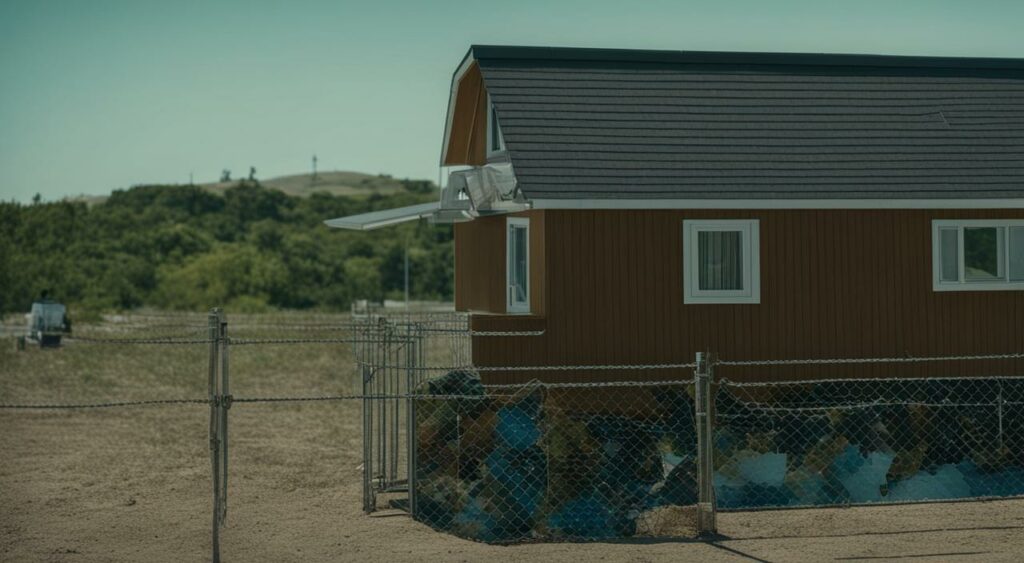
When it comes to understanding the zoning laws and regulations is crucial. These laws dictate where and how tiny houses can be built, as well as what types of structures are allowed in specific areas.
Below are some key zoning regulations that tiny house owners in Tennessee should be aware of:
Zoning Regulations for Tiny Houses
In Tennessee, the zoning regulations for tiny houses are typically determined by the local county or municipality. Some areas have specific zoning regulations for tiny homes, while others do not.
For example, the city of Nashville has recently updated its zoning regulations to allow for accessory dwelling units (ADUs), which can include tiny homes on wheels.
However, the requirements for these ADUs include a minimum lot size, building setbacks, and other restrictions that may make it difficult to build a tiny home on a small piece of land.
Building Codes for Tiny Homes
Building codes for tiny homes in Tennessee vary depending on the type of structure and its intended use.
If a tiny home is classified as a mobile home, it must comply with federal regulations set by the United States Department of Housing and Urban Development (HUD).
Additionally, tiny homes that are intended for permanent residential use must comply with the International Residential Code (IRC), which sets standards for safety and construction quality.
These codes cover things like foundation requirements, electrical systems, and plumbing.
Legal Requirements for Tiny Houses
In addition to zoning and building codes, there are also legal requirements that tiny house owners must comply with in Tennessee.
For example, if a tiny home is located within city limits, it may be subject to local property taxes and other regulations.
Furthermore, some areas may have restrictions on how long a tiny home can be parked in one location.
It is important for tiny house owners to research their local regulations and make sure they are in compliance to avoid any legal issues.
Understanding the Permit Process for Tiny House Construction in Tennessee

Building a tiny house in Tennessee requires compliance with various regulations and obtaining necessary permits. The permit process can be overwhelming, especially for those new to the tiny house movement.
However, understanding the process and adhering to guidelines is critical to avoid legal troubles and ensure the safety of your home.
Permit Process Overview
The permit process for tiny house construction in Tennessee involves obtaining several approvals at different stages of the construction process.
Here is a brief overview of the steps involved:
- Site Plan Approval: Before starting any construction, you must obtain site plan approval from the local zoning office or planning commission. The site plan must include details such as lot size, setback requirements, and utility connections.
- Building Permit: After site plan approval, you need to obtain a building permit from the local building code office. The permit ensures that your tiny house complies with state and local building codes and safety regulations.
- Inspections: During the construction process, you must schedule several inspections to ensure that your tiny house meets the necessary safety codes. The inspections may include a foundation inspection, framing inspection, electrical inspection, plumbing inspection, and final inspection, among others.
- Certificate of Occupancy: After the final inspection, you need to obtain a certificate of occupancy from the local building code office. The certificate validates that your tiny house is safe for occupancy.
Restrictions on Tiny House Living
While tiny houses offer a cost-effective and minimalist living solution, there are several restrictions that you need to consider when constructing or living in a tiny home in Tennessee. Some of these restrictions include:
- Minimum square footage requirements in some areas
- Restrictions on living in your tiny house full-time
- Restrictions on the placement of tiny houses on private property
Guidelines for Tiny House Development in Tennessee
To ensure a smooth permit process, it’s essential to follow the necessary guidelines and regulations for tiny house development in Tennessee.
Here are some guidelines to keep in mind:
- Research and adhere to all state and local zoning laws and regulations
- Obtain the necessary permits and approvals before starting any construction
- Work with a qualified contractor who understands tiny house building codes and regulations
- Schedule all necessary inspections during the construction process
- Ensure that your tiny house meets all safety and building code requirements
By adhering to these guidelines and obtaining the necessary permits, you can ensure a seamless permit process and enjoy the benefits of tiny house living in Tennessee.
Laws on Tiny House Parking in Tennessee
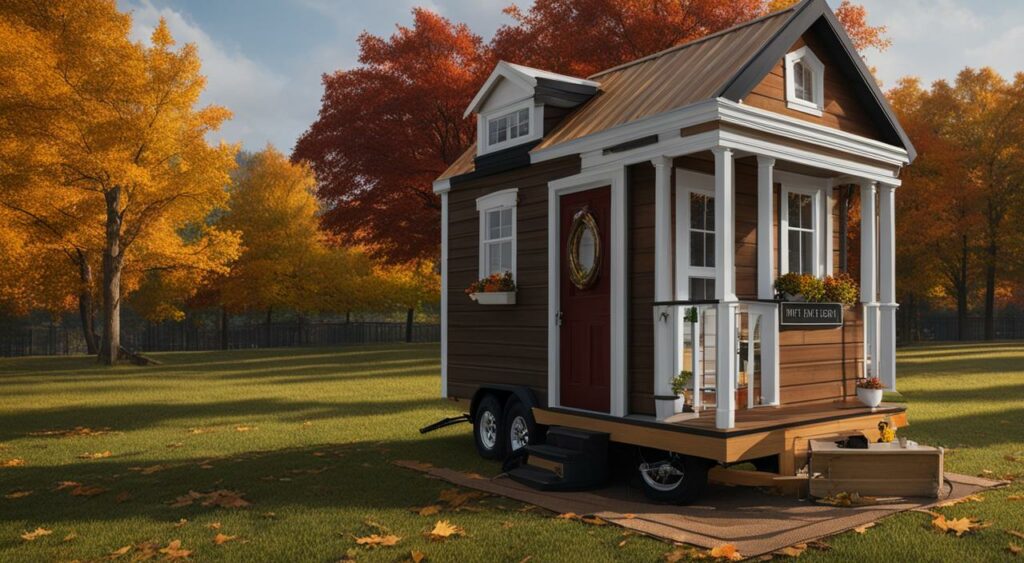
One of the biggest challenges for tiny house owners is finding a place to park their homes legally.
In Tennessee, there are specific laws and regulations that dictate where tiny houses can be parked, and failing to comply with these regulations can result in fines or even legal trouble.
Therefore, tiny house owners should be aware of these legal requirements to ensure compliance and avoid any issues.
According to the state’s zoning regulations for tiny houses, where a tiny house can park will depend on whether it is classified as a mobile home or a structure.
If a tiny house is classified as a mobile home, it can park in any area zoned for mobile homes.
However, if it is classified as a structure, it must comply with all applicable zoning regulations, including any setbacks and zoning requirements.
In addition, tiny house owners must also comply with any local county regulations regarding parking.
These regulations can vary depending on the county, so it is essential to research local laws and regulations before parking a tiny house.
| Tiny House Parking Regulations in Tennessee | Compliance Requirements |
|---|---|
| Parking location | The location where a tiny house can park depends on its classification as a mobile home or a structure. |
| County regulations | Tiny house owners must comply with any local county regulations regarding parking. |
| Permits | Some counties may require a permit for parking a tiny house. |
| Compliance with tiny house regulations | Tiny house owners must ensure compliance with all zoning and building regulations for their homes. |
Overall, understanding the laws and regulations related to parking a tiny house in Tennessee is crucial for tiny house owners to avoid any legal issues.
They must comply with state and county regulations and ensure compliance with all zoning and building regulations for their homes.
With proper research and due diligence, tiny house owners can find legal and safe places to park their homes in Tennessee.
The Tiny House Movement in Tennessee and Community Living
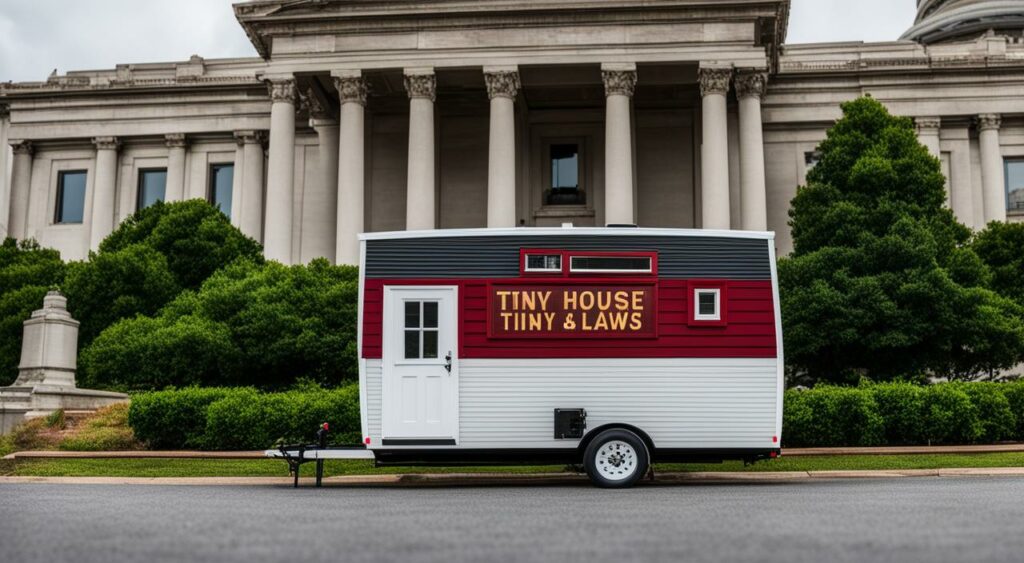
The tiny house movement has gained immense popularity in Tennessee in recent years.
With the growing interest in minimalist living, the state has seen an increase in the number of tiny house communities and developments.
However, for tiny house owners in Tennessee, it is essential to understand the legal considerations when it comes to living in a community.
According to Tennessee’s tiny house regulations, tiny houses built on a foundation are considered residential structures and are subject to the same regulations as traditional homes.
This means that tiny house owners are required to obtain the necessary permits and comply with building codes and zoning laws. In addition, tiny house owners must also adhere to any community-specific rules and regulations.
Many tiny house communities have their own set of guidelines, covering everything from parking restrictions to house size and design requirements.
While living in a tiny house community can offer numerous benefits, it is important to carefully consider the legal requirements and regulations before making the move.
Legal Considerations for Tiny House Owners in Tennessee
For tiny house owners in Tennessee, legal considerations are a crucial aspect of community living.
It is essential to understand the state’s tiny house regulations and any community-specific rules before making the decision to live in a tiny house community.
One of the key legal considerations for tiny house owners is the use of land.
In Tennessee, tiny houses can be parked on privately owned land, but zoning laws and regulations must be followed.
It is important to ensure that the land is zoned appropriately for residential use and that the tiny house meets all safety and building requirements.
Another legal consideration for tiny house owners is the issue of property rights. Tiny house owners who live in a community may face restrictions on their ability to modify or alter their homes.
It is essential to carefully review any community-specific rules and regulations before making any changes to a tiny house. In addition, tiny house owners must also ensure that their homes comply with safety and building codes.
This includes ensuring that the tiny house has appropriate fire safety measures in place and meets all electrical and plumbing requirements.
Tennessee Tiny House Regulations
Tennessee’s tiny house regulations require tiny houses to comply with the state’s building codes and zoning laws.
The state’s building codes cover a wide range of safety and design requirements, including occupancy limits, minimum square footage, and construction materials.
In addition, tiny house owners must also comply with zoning laws, which regulate land use and development.
Zoning laws vary by municipality and can cover everything from setbacks and lot size requirements to the number of residential units allowed on a single piece of property.
For tiny house owners who are considering living in a community, it is important to review the community-specific regulations before making any decisions.
Many tiny house communities have their own set of rules and regulations that must be followed.
Future Outlook for Tiny House Living in Tennessee
The future of tiny house living in Tennessee looks bright. With the growing popularity of minimalist living, the state is likely to see an increase in the number of tiny house communities and developments.
However, it is important for tiny house owners to carefully consider the legal considerations and regulations before making the decision to live in a community.
By understanding the state’s tiny house regulations and any community-specific rules, tiny house owners can enjoy all the benefits of community living while remaining compliant with the law.
Permits and Ordinances for Tiny House Communities in Tennessee
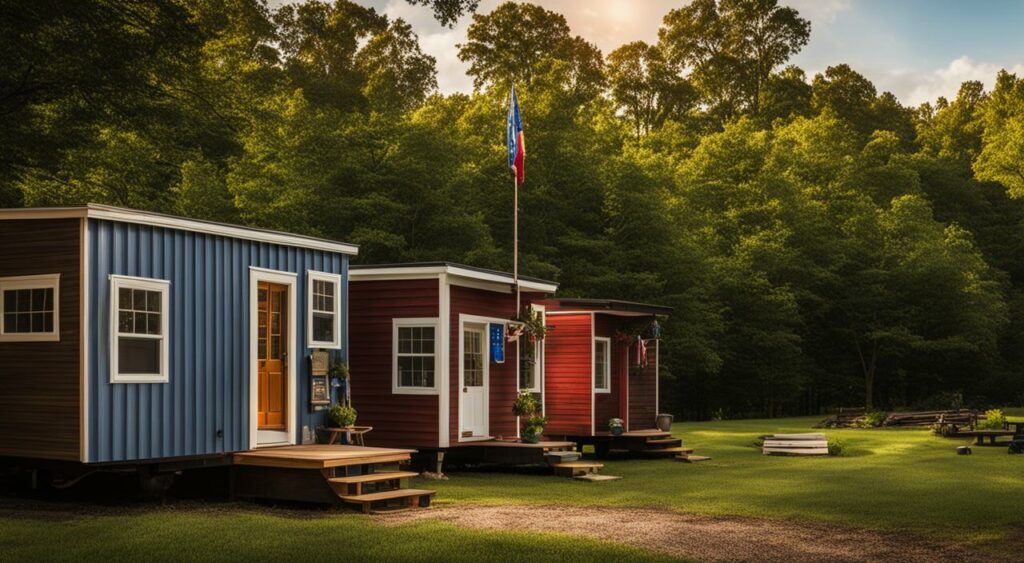
A tiny house community in Tennessee can be a great way to enjoy the benefits of tiny house living while still being part of a larger community.
However, it’s important to understand the permits and ordinances required to establish and operate a tiny house community in the state.
Tennessee has specific regulations for community living, which include zoning laws and legal requirements for tiny houses.
Before establishing a tiny house community, it’s important to research the applicable regulations at both the state and local levels.
Zoning Laws for Tiny Homes in Tennessee
One of the most important considerations for establishing a tiny house community in Tennessee is zoning laws.
Zoning laws dictate the allowed uses for land and buildings in a specific area, and they can vary widely depending on location.
Before purchasing land or property for a tiny house community, it’s important to research the zoning laws in the area to ensure that they allow for residential use and tiny houses.
Some areas may have specific requirements for minimum lot size, setbacks, and other considerations that must be met before a tiny house community can be established.
It’s also possible to seek a zoning variance or special use permit to establish a tiny house community in an area that would otherwise not allow it.
This process can be complex and may require legal assistance, so it’s important to fully understand the process and requirements before proceeding.
Legal Requirements for Tiny Houses in Tennessee
In addition to zoning laws, there are legal requirements for tiny houses in Tennessee that must be met when establishing a community.
These requirements can vary depending on the location and specific use case, so it’s important to research and understand the applicable regulations.
One of the most important legal requirements for tiny houses in Tennessee is compliance with building codes.
Tiny houses must be built to meet specific safety and structural requirements, and permits may be required to ensure that the building process complies with these regulations.
Other legal requirements may include utility hookups, waste disposal systems, and fire safety equipment. It’s important to research all applicable regulations to ensure compliance and avoid any potential legal issues.
Permits for Tiny Houses in Tennessee
When establishing a tiny house community in Tennessee, there are several permits that may be required to ensure compliance with applicable regulations.
First and foremost, building permits may be required for the construction of tiny houses within the community. These permits ensure that the construction process meets all applicable building codes and safety regulations.
Other permits may include permits for water and sewer connections, electrical connections, and waste disposal systems.
It’s important to research all necessary permits and ensure that they are obtained before beginning construction or operation of a tiny house community in Tennessee.
Exploring Tiny House Size Restrictions and Property Requirements in Tennessee
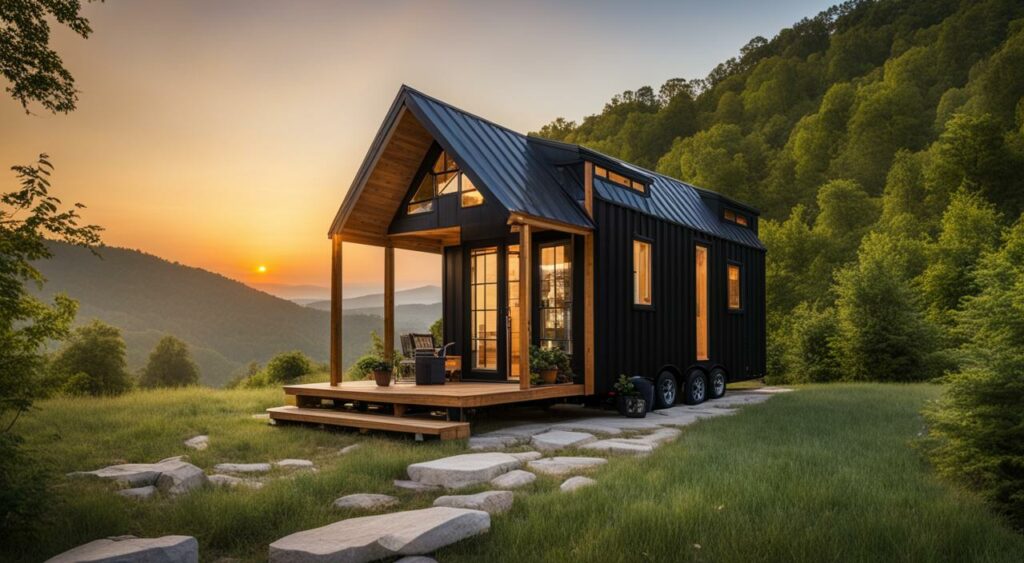
When it comes to tiny house living in Tennessee, owners must comply with specific building codes, permits, and regulations that govern the size and placement of their homes.
Firstly, it is essential to understand the building codes for tiny houses in Tennessee.
These codes specify the minimum square footage allowed for a tiny home, which varies between 100 and 400 square feet depending on the area.
Additionally, tiny houses must comply with safety requirements, such as having a smoke detector and a carbon monoxide detector installed.
Moreover, obtaining a Tennessee tiny house permit is crucial for building and living in a tiny house.
The process involves submitting plans and obtaining approval from the local authorities, which may include zoning officials, building inspectors, and code enforcement officers.
These permits ensure that the tiny house meets all applicable building codes and zoning regulations. Furthermore, the placement of tiny houses in Tennessee is subject to property requirements.
Tiny houses cannot be placed just anywhere; they must be on a suitable foundation and comply with property setback requirements.
The setback requirements dictate the minimum distance between the tiny house and the property line, which varies from one area to another.
Overall, anyone considering tiny house living in Tennessee must understand the regulations around building codes, permits, and property requirements.
This knowledge ensures compliance with all relevant laws and regulations and enables a smooth transition to tiny house living.
Tiny House Living in Tennessee: Advantages, Challenges, and Future Outlook
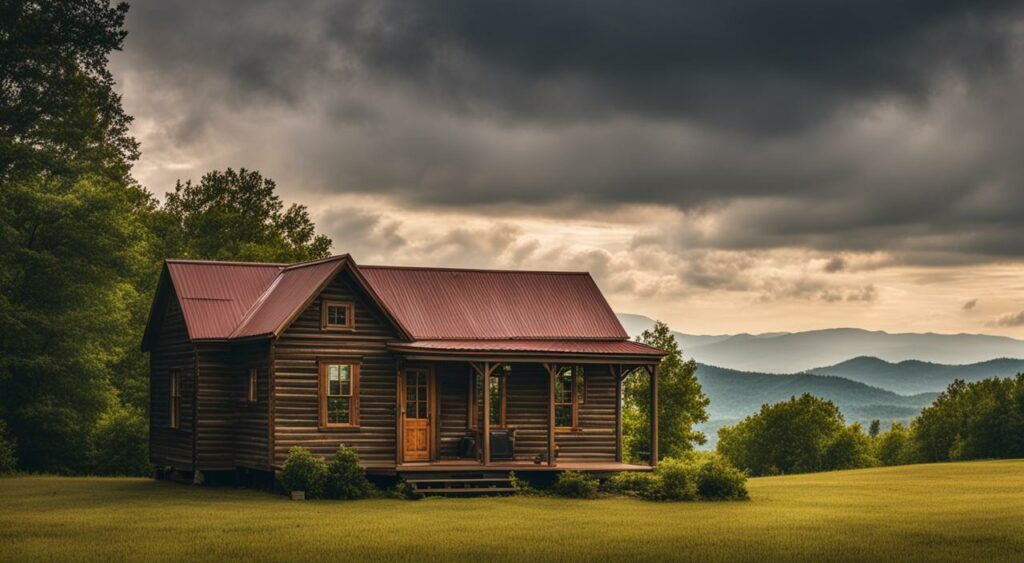
Tennessee is becoming a popular destination for those interested in the tiny house movement. The state offers a beautiful landscape and a variety of affordable properties that are perfect for tiny homes.
One of the biggest advantages of tiny house living in Tennessee is the sense of community it provides. There are several tiny house communities in the state that offer residents a chance to live in a close-knit and supportive environment.
These communities often have shared spaces and amenities, making it easier for residents to socialize and form lasting connections.
However, there are also challenges to tiny house living in Tennessee. One of the biggest challenges is finding a property that meets the legal requirements for tiny homes.
While there are many affordable properties in the state, not all of them are suitable for tiny house construction. Despite these challenges, the future outlook for tiny house living in Tennessee is bright.
The state continues to attract a growing number of tiny house enthusiasts, and there are many opportunities for developers to create new tiny house communities.
| Advantages | Challenges | Future Outlook |
|---|---|---|
|
|
|
Overall, tiny house living in Tennessee offers many advantages, from community to affordability and sustainability. While there are challenges to overcome, the future looks bright for the tiny house movement in the state.

Conclusion
Living in a tiny house in Tennessee can be an incredibly rewarding experience, but it’s important to understand and comply with the various laws, regulations, and requirements.
This includes obtaining permits for tiny houses in Tennessee, adhering to Tennessee tiny house ordinances, and following regulations for tiny houses in Tennessee.
By understanding the legal requirements, compliance with building codes for tiny houses in Tennessee, and zoning laws for tiny homes in Tennessee, tiny house owners can create safe and comfortable living spaces.
They can also explore the growing community of tiny house living in Tennessee, including tiny house communities in Tennessee and the tiny house movement in Tennessee.
Overall, taking the time to learn about the legal considerations and requirements for tiny house living in Tennessee will ensure that tiny house owners can enjoy their homes without running into legal issues or facing challenges down the line.

FAQ
-
What are the tiny house laws in Tennessee?
Tiny house laws in Tennessee vary depending on factors such as location and size. It is important to understand the zoning laws, building codes, and permit requirements for tiny house construction and living in the state.
-
What are the zoning laws and regulations for tiny houses in Tennessee?
Zoning laws and regulations for tiny houses in Tennessee dictate where these homes can be located and what requirements must be met. Both state and county regulations need to be considered when determining the legality and feasibility of living in a tiny house in Tennessee.
-
How do I comply with building codes and the permit process for tiny house construction in Tennessee?
When constructing a tiny house in Tennessee, it is essential to comply with building codes and obtain the necessary permits. These codes and permits ensure that your tiny house meets safety and structural requirements.
-
What legal considerations and requirements should I be aware of as a tiny house owner in Tennessee?
As a tiny house owner in Tennessee, it is important to understand the legal considerations and requirements of living in a tiny house. This includes knowing if tiny homes are legally allowed, rules for residential use, and any specific regulations in the state.
-
What are the zoning laws for tiny homes in Tennessee?
Zoning laws for tiny homes in Tennessee govern the land use and placement of these structures. It is important to be aware of the specific zoning regulations, including setbacks and other requirements, for residential use of tiny homes in the state.
-
How can I navigate the permit process for constructing a tiny house in Tennessee?
Navigating the permit process for constructing a tiny house in Tennessee involves understanding the steps involved and any restrictions on tiny house living. Guidelines for developing tiny house communities may also be applicable.
-
What are the laws on tiny house parking in Tennessee?
The laws and regulations on parking a tiny house in Tennessee dictate where these homes can be parked and any restrictions that apply. It is important to ensure compliance with these regulations to avoid potential legal issues.
-
Can I live in a tiny house community in Tennessee?
Tiny house communities in Tennessee are becoming increasingly popular. However, there are legal considerations and requirements, such as zoning laws and permits, that need to be met when living in a tiny house community.
-
What permits and ordinances are required for establishing and operating tiny house communities in Tennessee?
Establishing and operating tiny house communities in Tennessee requires obtaining the necessary permits and complying with specific ordinances. These permits and ordinances ensure that the community meets legal requirements and regulations.
-
Are there any size restrictions and property requirements for tiny houses in Tennessee?
Tiny houses in Tennessee may have size restrictions and property requirements that need to be taken into account. Building codes, permits, and regulations govern factors such as square footage and placement of tiny homes in the state.
-
What are the advantages and challenges of tiny house living in Tennessee?
Tiny house living in Tennessee offers benefits such as affordability, sustainability, and a simpler lifestyle. However, challenges may arise in terms of legal requirements, finding suitable locations, and accessing necessary utilities. The future outlook for tiny house living in the state looks promising as more communities and resources become available.
-
What are the key points to remember about tiny house laws and regulations in Tennessee?
In conclusion, it is crucial to understand and comply with the various laws, regulations, and requirements for tiny house living in Tennessee. This includes zoning laws, building codes, permit processes, and legal considerations specific to the state. Prior knowledge and adherence to these regulations will promote a successful and legally compliant experience in tiny house living.

